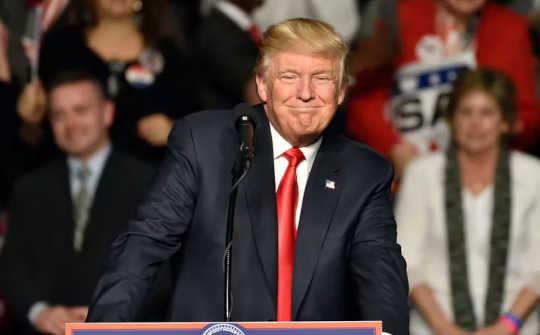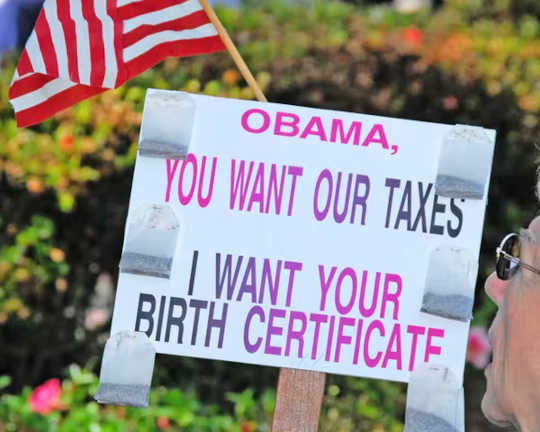
Donald Trump perpetuated the ‘birther’ movement for years. (Shutterstock)
Conspiracy theories have mutated into conspiracism, a transformation marked by people rejecting proof and evidence in favour of frivolous speculation. That’s what political scientists Russell Muirhead and Nancy Rosenblum suggest in their book A Lot of People are Saying.
In short, conspiracism is conspiracy without the theory.
Muirhead and Rosenblum use the “birther” conspiracy to illustrate conspiracism. “Birtherism” is the belief that Barack Obama was not born in the United States, therefore ineligible for the presidency.
It is an example of conspiracism because it causes the relentless denial of simple facts, a characteristic that makes it appealing to far right figures like Donald Trump. Conspiracism is opposed to logic and reason, and it helped sprout the racist attacks against Obama and others.
At the heart of Rosenblum and Muirhead’s crusade against conspiracism is a concern for standard epistemological methods (or logical reasoning), a hallmark of classic conspiracy theories. But their concern motivates me to ask if conspiracists actually deny evidence and standard methods of logical reasoning?
To suggest that conspiracy theorists deny standard methods of logical reasoning implies that we definitively know what evidence and standard methods of logical reasoning look like.
Conspiracy theorists actually use evidence and standard logical reasoning to put forward their often-racist beliefs. In fact, they use evidence to connect dots and identify patterns that fall out of the scope of Rosenblum and Muirhead’s analysis.
But evidence is political, and some forms of evidence are seen by some while not seen by others. For example, you might recall Republican Sen. James Inhofe bringing a snowball onto the senate floor as evidence that the globe is not warming. His act demonstrates the way that evidence can be used to put forward a political message before a necessarily factual one. To him, the snowball was evidence.
Evidence of a conspiracy?
On May 18, 2012, Donald Trump tweeted, “Let’s take a closer look at that birth certificate. @BarackObama was described in 2003 as being ‘born in Kenya.’” Referring to a literary promotional booklet that identified Obama as being “born in Kenya and raised in Indonesia and Hawaii,” Trump took this as confirmation of his birtherism, intensifying his animosity for America’s first Black president.
For Rosenblum and Muirhead, Trump’s use of this piece of evidence would not meet their standard for legitimate evidence because it can be easily refuted. However, when Trump and other birther conspiracists cite such examples as evidence of a conspiracy, they are drawing connections between more than events and unexplained phenomena; they are using Obama’s race as evidence of his being non-American.

Trump’s use of evidence would not meet Rosenblum and Muirhead’s standard for legitimate evidence. (Shutterstock)
Trump’s insistence on the point that Obama was born in Kenya dovetails with a broader evidential claim that Obama’s Blackness attributes him an African heritage and place of birth — ignoring of course the long lineages of Black folks in places all over the world.
In addition to connecting the dots between Obama’s race and his foreignness, Trump introduced the consequences of his findings on Obama’s policies as well. Tweeting on Oct. 31, 2013: “‘If you like your healthcare plan you can keep it.’ = ‘I was born in Hawaii.’”
For Trump, Obama’s skin colour is a dot that is connected to his foreignness that is connected to an African heritage that is connected to his “anti-American” health care policies. Trump used evidence and his own standard methods of logical reasoning to come to this conclusion its just not one recognized by Rosenblum and Muirhead as valid.
What evidence can teach us
In America, where anti-Black racism functions as the bedrock of many institutions, skin colour can be used as evidence of someone’s opposition to America’s values.
By denying the way that Trump connects the dots between these pieces of evidence, Rosenblum and Muirhead contribute to the hidden structures that guide American political and social life that repeatedly disenfranchise people of colour by denying them decision-making positions across many American institutions.
After all, the birther conspiracists were silent about Ted Cruz not being born in the United States even though he admitted it. Cruz, however, is white-passing.
Conspiracy theories demand that we interrogate how evidence might be used to do more than support a conspiracy; it might work to maintain a certain status quo.
About The Author
David Guignion, PhD Candidate, Media Studies, Western University
This article is republished from The Conversation under a Creative Commons license. Read the original article.
























